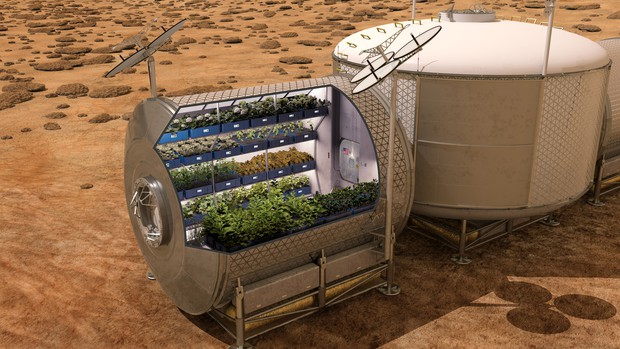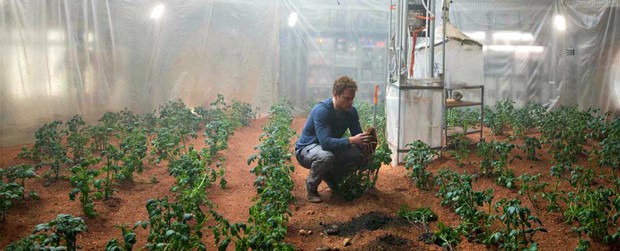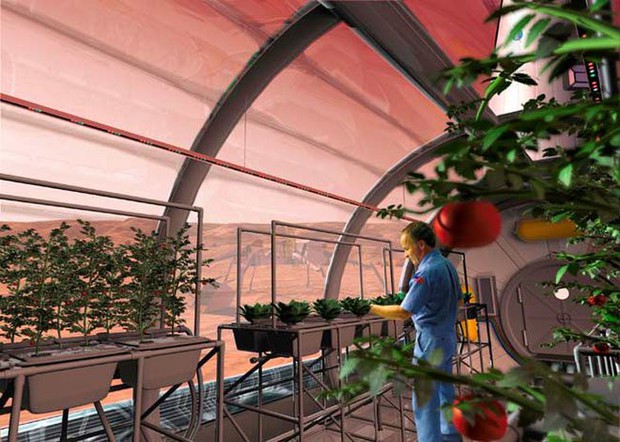Planting trees on Mars is almost an impossible task, but there is a way.
With the plan to conquer Mars within the next decade, from now on, the experts have it all set. And one of the most important things of all is answering the question: food on Mars.
Obviously, if humans set foot on Mars and build a base, the most important thing is establishing a steady supply of food. We will not be able to continuously transport food from Earth permanently, because the costs will be terrible. Obviously, there must be some way to grow food directly on the Red Planet.
More recently, scientists have confirmed the existence of a huge underground lake located at the south pole of Mars. And is this number of countries a sufficient condition for us to have a stable food supply?
Mars – brother is too harsh on Earth
Mars has many similarities to Earth, but still differs in many ways. First, the gravity here is only 1/3 that of our planet.
The red planet also receives only half the amount of sunlight compared to Earth, but the amount of ultraviolet and cosmic radiation is much greater.
Third, the difference between daytime and nighttime temperatures on Mars can reach hundreds of degrees C. The atmosphere here is extremely thin, mostly CO2.
The soil on this planet is also very different. While Earth’s earth is rich in nutrients, Mars is covered in regolith – a solid containing perchlorate that is extremely toxic to humans.
Additionally, water on Mars also exists primarily in the form of ice. Even with the giant lake that was found, it lay thousands of feet deep under the ice. And even if water is absorbed, with too low atmospheric pressure, water evaporates at a temperature of only about 5 degrees Celsius.
Over hundreds of millions of years, new plants have adapted to the conditions of life on Earth. And because the difference is so big, it is certain that the trees of Earth cannot live well on Mars.
The problem is knowing which plantation!
Many previous studies have suggested using bacteria for food on Mars. In addition, building a greenhouse system similar to that used on the ISS space station is also a suitable solution.
And more recently, an Australian study came up with the idea of using biosynthesis technology to improve vitality and efficiency when planting trees on Mars.
For those who don’t know, biosynthesis is an extremely potential area. This allows us to combine the foundations of engineering science, genetic science and computer science, aggregate it and feed it into living organisms.
In short, we can read DNA, design our own genetic systems, test them ourselves. In short, creating a life form by hand.
This technology has now gone so far as to allow us to set up installations using autonomous robots. They are called biofoundry, with the ability to test millions of DNA samples to find the best match.
With them, humans can create foods that easily adapt to all environmental conditions, even if it is a horrific environment like Mars.
For example, we can improve the photosynthesis of plants, to make them more resistant to huge amounts of radiation. In addition to drought and cold resistance, it should also be adjusted accordingly.
And not just trees, we can also use bacteria to help make Mars’ soil more fertile. All are within the reach of biosynthesis technology.
The app isn’t just in the distant universe
Creating a viable generation of cultures on Mars is a thing of the future. Now this technology is of great benefit to everyone on Earth.
It is important to know that the world’s population is increasing, resulting in an accelerated demand for food, while the growing area of land decreases. So, to meet the demand, we need to increase agricultural production, but at the same time not let the environment be affected.
The best way to do this is to improve the cultivar, and the main solution is biosynthesis.






